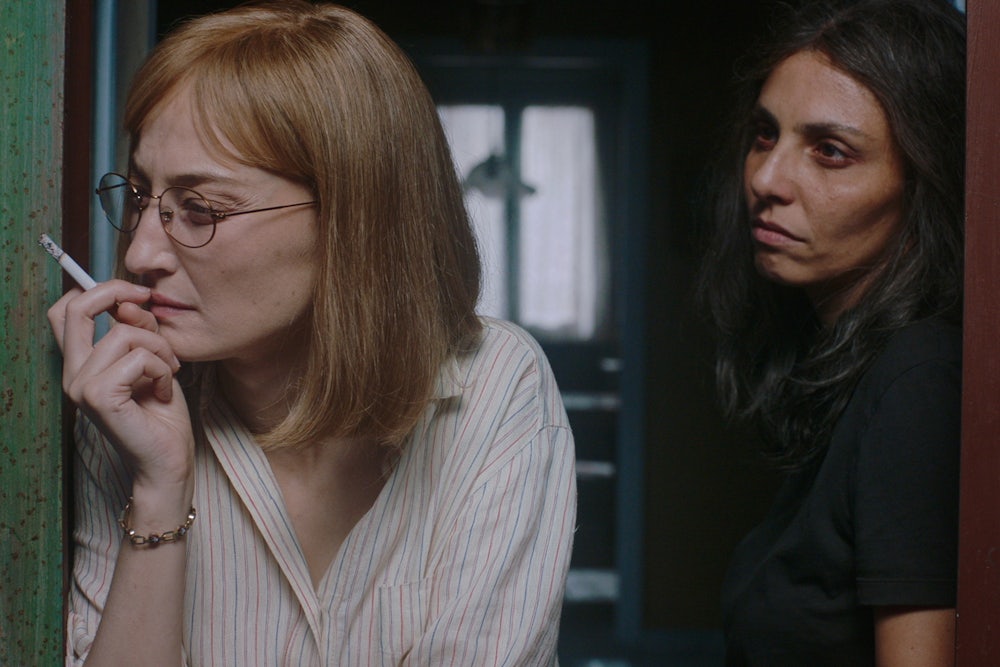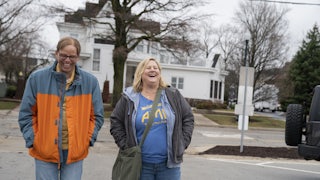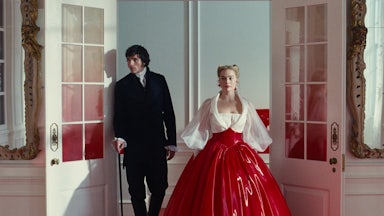It’s the end of the year, and disappointment is in the air. It has been for a while now. Given the current state of liberal politics in the United States, it’s easy to imagine why it might feel that way. 2024 has been a cascade of disappointments, a series of escalating underperformances from people we readily or reluctantly put our faith in, raising our hopes and crashing them down to the ground. The first domino was Joe Biden’s hilariously inept performance at the first presidential debate. It was a moment designed by his staff to showcase his intellectual acuity, to counter the growing buzz that he was too old, too addled, too tired to beat Trump for a second time. I don’t know many people who thought he’d effortlessly clear that bar, but I also don’t know many who foresaw the world-historical face-plant that transpired on-screen before our very eyes. Having already squandered much of his goodwill by bankrolling ghastly atrocities in Gaza and promoting his economic achievements with all the baffling lassitude of AppleTV+ promoting an original TV series starring multiple Oscar winners, Biden disappointed at his one remaining job: to win.
Quickly, though, our hopes were raised again. Kamala Harris took over with a great amount of energy and momentum, much of which emanated from Gen Z and even from the unlikely progressive–left wing online. She could take over, and not only would she be younger, quicker, more fitted to the times, but she also, some of us hoped, might betoken a change in this country’s disastrous policy in Gaza. Hope stirred yet again among even the most hopeless political observers. But after an ecstatic few weeks, the vibe shifted. The Harris campaign adopted disappointment almost as a thematic focus. And as Hot Brat Summer gave way to Cheney Season, we were let down yet again. From big-ticket decisions to the stage-managing of public appearances, the Harris campaign gave us disappointment after disappointment. There was a whole day during the Democratic National Convention when the entire internet became convinced that a much-ballyhooed “surprise” guest was going to turn out to be Beyoncé; it was Leon Panetta. Tim Walz made his way onto the ticket as an affable attack dog unembarrassedly touting progressive achievements; he delivered a cautious and obsessively courteous debate performance. The post-Dobbs wave never materialized, the Girl Dad voting bloc did not show up, Ann Selzer’s Iowa poll was wrong about Harris’s strength. And after all that, she didn’t even go on Hot Ones.
A pervasive sense of disappointment has colored the way we perceived TV this year too. Some of 2024’s best TV writing has focused on the vast middlingness of the contemporary streaming landscape. There was James Poniewozik’s well-regarded manifesto about the “comforting problem of Mid TV”; M.C. Mah’s theory of the “good fan” who holds their prestige TV shows to an impossibly low standard; Daniel Bessner’s eviscerating examination of Hollywood’s now systemic lack of creative ambition; Olivia Stowell’s great, granular, “Let Down by Television,” an article about why contemporary viewers are asked to be “bowled over by merely competent” episodes and series. Stowell’s essay itself appeared in the inaugural issue of a new little magazine called the Mid-Theory Collective. Just this month, critic Jen Chaney described 2024 as “an uneventful wake for the peak TV era.”
The premise undergirding all these thematically linked though contextually quite different takes is that the TV we’re watching, even if it’s perfectly pleasant, even if millions of fans say otherwise, is, cosmically, a little disappointing. Rather than contend with the idea of decline, rather than torture yourself—as I have, this year—with rewatches of bygone series like Friday Night Lights that could never, under any circumstances, be greenlit in this media environment, many viewers have recalibrated; begun to expect less. But for those of us who have tried hard not to accept this state as a foregone conclusion, it’s been difficult not to see the year in TV as a disappointment. It’s not all it could be, not all it should be, not quite what passionate, thinking, feeling viewers deserve for the tremendous expenditure of time they require.
While I remain an optimist, clinging for dear life to the handful of series that handily beat the “mid” allegations this year—about which more later—it is certainly true that plenty of series in 2024 have let us down. I would have bet money that Cate Blanchett, Kevin Kline, and Alfonso Cuaron could have managed to make a TV show that didn’t seem designed to insult its viewer. Disappointing. Netflix keeps delivering its most appealing TV series in such tiny proportions—Bridgerton season 3 clocked in at a paltry eight episodes, The Diplomat at a scandalous six—that it seems less like a dump and more like a dollop when they drop them all at once. Disappointing. The Bear’s creative team returned from a triumphant second season having learned, seemingly, every wrong lesson possible, delivering a pompous, aimless third season. The show was rescued only by a pair of quiet, standout episodes—including Ayo Edebiri’s directorial debut—that gave us a fleeting glimpse of what the show might have looked like free of its new decadent style. Disappointing, Chef! Great shows (Somebody Somewhere, My Lady Jane, Our Flag Means Death, Rap Sh!t, Evil) were canceled; awful shows (3 Body Problem) were renewed. Racist and misogynist trolls managed to sink The Acolyte and made it nearly impossible to have a reasonable conversation about the relative quality of True Detective: Night Country online. And beyond even that, Twitter, where I first found friends to talk about TV and share my work with over a decade ago, was transformed, by design, into a place that disincentivized those very types of connection. Disappointing.
This
is, admittedly, and somewhat hyperbolically, a grim picture to paint. But I’m
not writing about disappointment and the year in TV only because I feel
disappointed in the year in TV. I’m also writing about it because some of the
very best TV shows I saw this year are themselves about disappointment.
Narratively, formally, even stylistically, many of the shows that felt most
urgent to me this year took as their subjects stymied hope, frustrated
ambition, letdowns big and small.
A great example of this is Netflix’s excellent, strangely underdiscussed romantic-comedy series One Day. The show is based on David Nicholls’s bestselling novel, which tracks the lives of Dexter and Emma, a pair of occasionally star-crossed lovers, by narrating what happens to them every July 15 for a period of 20 years. The 2011 feature film adaptation (starring Anne Hathaway) suffered from having to condense this sprawling, economical formal constraint into 108 minutes, but the streaming series cannily takes advantage of its episodic medium, mostly dedicating each of its 14 episodes to the July 15 of a single year (the final two episodes cover a few years at a time).
What could be disappointing about a TV show afforded both the opportunity to deploy an ambitious formal gimmick and miraculously granted the luxury of a 14-episode season in this economy? First, having each episode dramatize only a single day’s events means that viewers really feel, by way of a kind of negative accumulation, all that we can’t and don’t see. The show is admirably abrupt about this, rarely ever cheating, allowing off-screen events, however monumental, to remain off-screen, perceived only by their impact on the 15th of July. Sometimes we see both characters—played with incredible natural ease by Ambika Mod and Leo Woodall—in an episode, sometimes only one or the other. Sometimes an episode meaningfully and dramatically advances the plot, sometimes it just sits back and observes. It’s a frustrating narrative technique, but, in its deprivations and disappointments, it formally makes the argument about time and regret, pride and prejudice that animates the story as a whole. And that’s not even to mention the now-infamous, but still eminently spoilable, tragic twist that ends the whole series, rendering bitter the otherwise sweet conclusion of 12 years, and episodes, of will-they-won’t-they. One Day is a show that speaks plainly and formally embodies an insight about disappointment itself: that every human life, no matter how joyfully well spent or devastatingly wasted, is set within an arc of disappointment in the end. If you’re looking for meaning in the big payoff, you’re looking in the wrong place.
One Day is not the only show to tackle the frustrations of that kind of longue durée thinking. Shōgun, FX’s surprise epic revival, is built around a kind of ritualized practice of withholding narrative satisfaction. The series dramatizes the patient mousetrap of a plan devised by Toranaga (Hiroyuki Sanada) to violently depose the corrupt bureaucrats scheming against him and build a new dynasty in his own image. His closest collaborators are rarely read in to the full scope of the plan, and, even if they were, nearly all of them die before the pieces come together. At his execution, Yabushige (Tadanobu Asano) pleads with Toranaga to tell him what’s going to happen, only for Toranaga to reply, “Why tell a dead man the future?” And of course, the primary irony of all this is that it turns out Toranaga’s plan, all along, was designed to avoid the kind of sweeping, gory battle the whole show seemed destined to give us. That Shōgun marshals the aesthetic grandeur of classic Hollywood epic cinema to give us this story of principled denial and restraint was one of the most gratifying shocks on television this year.
Agatha All Along takes its coven of witches on a perilous journey through the fabled “Witches’ Road” only to eventually reveal that that road was, in fact, a fiction unconsciously brought to life by one of the travelers. People died, but nothing really actually happened. The show was by no means one of the best of the year, but some of its best ideas came from the central concept that imposing a dramatic and satisfying narrative onto our lives is merely a way of disguising, and refusing to contend with, their ultimate disappointment. FX’s Say Nothing told a story of sacrifice and starvation that ended in wan compromise, the betrayal of the ideals for which young people gave their lives.
And HBO’s Somebody Somewhere, perhaps the best series of the year, ended its three-season, lovingly observed run as one of the finest explorations of disappointment ever to happen on television. Coming to terms with the loss of a loved one, the loss of a future you once imagined, the dissolution of a marriage, the pain of estrangement, letting go of the dream of children, the dream of independence, the dream of the way things were supposed to go. For Somebody Somewhere to find hope, even euphoria, in a universe defined by these profound disappointments, is its gift to us as viewers. Sam (Bridget Everett) ends the series with the corny but still apposite words of Miley Cyrus. “Ain’t about what’s waiting on the other side,” she sings. “It’s the climb.”
There’s something impressive, something jarringly healthy, about series that allow this level of frustration, these gaps of grief or unknowing to structure them. Part of what’s so “mid,” if you buy that framing—or the fortysomething critic typing that word as if it’s something he’d feel even close to comfortable saying out loud in front of a teenager—about TV this year is its insistence on safety. Studios greenlight endless expansions of comfort food I.P.; they produce one-season wonder after one-season wonder for fear of giving too much space to an unprofitable concept; they guard against risk at all costs and, in doing so, risk losing the opportunity to produce the kind of transformative art that TV writers have spent the past two decades convincing all of us that they can do. To see shows like these take those risks anyway, to push our expectations only to force us to rethink them; it’s hard to feel let down by that.
I said that Somebody Somewhere is perhaps the best series of the year because I don’t know that it is, for sure. And the reason I don’t know is that I have not finished watching the final season of HBO’s My Brilliant Friend yet, and I suspect its band of Neapolitan strivers may edge out my friends from Manhattan, Kansas. For four seasons, Saverio Costanza, alongside a staff of writers including Elena Ferrante herself, has been transforming the Italian novelist’s beloved tetralogy into one of the most stunning pieces of television I’ve ever seen. Our protagonists—existential frenemies Lila and Lenu—have aged up across two separate recastings; the world of the show has stretched from intimate domestic affairs to revolutionary struggles; and throughout, life in the twentieth century has been presented as a series of transcendent disappointments strung together, redeemed, and repaired by the radiant core of this one friendship.
Whenever I watch a season of My Brilliant Friend, I can’t bear to hurry through it. Like many of the greatest shows of recent years, it is utterly compelling but almost impossible to binge, so dense with feeling and so operatic in its approach. I pace it out; I savor each episode. So, to end this final essay of 2024 in a bit of disappointment, I can’t say what the show of the year is. I’ll finish this batch of episodes sometime in January, I expect, but, by then, it won’t matter to me whether Somebody Somewhere squeaks ahead or My Brilliant Friend overwhelms me with its crescendo of loss, guilt, and frustrated desire. These are two shows that will stay with me, even if they came in a relatively fallow year of TV; two shows that left us something without giving us everything we might have thought we wanted. As the poet says, it’s not about what’s waiting on the other side.






